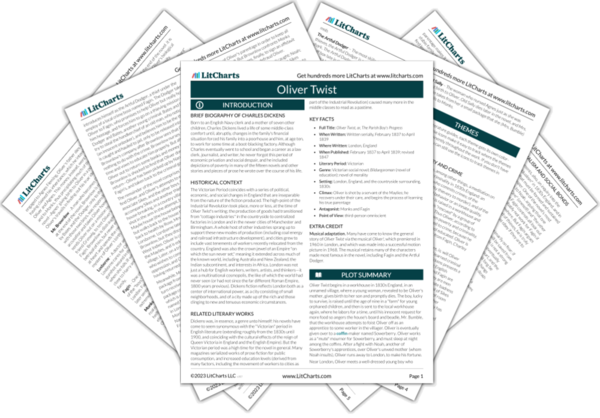Summary
Analysis
The narrator closes out the novel by detailing the fortunes of the characters. Rose and Harry marry, and they move to the country parsonage where Harry works; Mrs. Maylie comes as well. Oliver's inheritance is meted out, by Brownlow, half to Oliver and half to Monks, since Brownlow believes this money might allow Monks to start a new life as a virtuous man. But Monks spends this money in the New World and remains a knave until his death.
It is now the job of the narrator to tie in a bow the story of Oliver and his friends and former enemies. Monks, in keeping with his "biological" predilection to crime, does not become good but rather wastes the rest of his inheritance on criminal behavior; he is no better than when he started, before Oliver came into his life.
Themes
Brownlow officially adopts Oliver as his son. He and Oliver move to within a mile of the parsonage where Harry and Rose live. And Losborne, inventing an excuse to be close to the group he loves so much, also moves near the parsonage "because the air agrees with him"; he is very content to be near the family. Grimwig and Losborne have become good friends, and Grimwig often jokes about the time when he did not believe Oliver to be a good boy.
Oliver has found, finally, the family that cares for him, that can support him through times of strife. It is a bonus element that there are those in the family, like Rose, who are related to Oliver by blood—but this is not necessary, Dickens shows, for a strong family to develop. The bond between father and adopted son here is a secure one, and a bond of love. And such bonds, such family, are held up as the most powerful and important forces in the novel.
Themes
Noah and Charlotte receive pardons for their small role in the crimes of Fagin, but they become a con-man team, faking illness and taking money from people on the streets of London. The Bumbles, removed of their positions by the law, eventually become paupers and must live in the workhouse they once managed. Giles and Brittles stay on to help in the Maylies' new home, and Bates, having repented for a life of crime, takes on a series of difficult jobs, mostly involving physical labor.
One of the novel's more satisfying ironies—the Bumbles are forced to become the paupers they have always despised, showing them firsthand that poverty is not necessarily a "natural" condition, but rather something into which people can fall. Dickens has given them their comeuppance. Bates meanwhile, has escaped the criminal life, but he too seems to be partially punished for the life he used to lead—it is as if he has escaped hell but can only get so far as purgatory.
Themes
The narrator ends the novel by describing Oliver's happiness with his aunt Rose, his adopted father Brownlow, who educates him in the books he once promised Oliver would read, all in the beautiful country village. The final paragraph of the novel reveals that an empty tomb, one without a coffin, has been kept for Agnes in the local church—though she was a loving woman, she was, according to the narrator, "weak and erring," for having succumbed to her liaison before marriage. The novel ends.
This is perhaps a strange note on which to end the novel, but Dickens wants to make clear to Victorian audiences that Agnes does not "get a pass" for behavior that no one in England, at the time, felt comfortable excusing. Agnes gave birth to a virtuous boy, but she herself was not virtuous, an "imperfect vessel" from which a great deal of good did come.
Themes
Get the entire Oliver Twist LitChart as a printable PDF.













